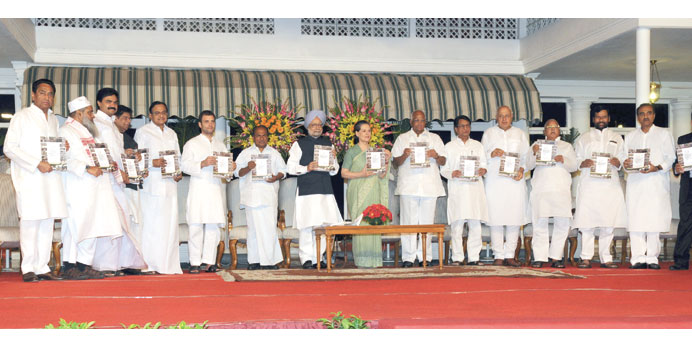Prime Minister Manmohan Singh releases the “Report to the People” in New Delhi yesterday. The report card lists achievements that include a drop in those living below the poverty line to 350mn from 400mn. Also seen are Congress president Sonia Gandhi, senior ministers and leaders of alliance partners.
Agencies/New Delhi
The scandal-rocked United Progressive Alliance led by the Congress Party marked its last anniversary in power yesterday before facing voters in 2014, amid dismal poll ratings and a growing clamour for Prime Minister Manmohan Singh to quit.
An opinion poll by the CNN-IBN television network made grim reading for the government, with 67% of respondents saying it has lost its credibility due to multiple graft scandals and 61% saying Singh should exit.
Analysts described the ratings as further evidence of a government in terminal decline, with Rajeev Malik, economist at investment house CLSA, saying the poll read almost like an “obituary.”
Opposition calls have mounted for the resignation of Singh, splashed on a recent magazine cover under the headline “Dr Dolittle” for overseeing a sharp economic slowdown and turning an apparent blind eye to years of corruption.
“Congress should apologise for its years of misrule,” Sushma Swaraj, leader of the main opposition Bharatiya Janata Party (BJP), told a news conference, adding Singh may be “prime minister but he is no leader.”
Congress was shaken this month by the resignation of two ministers related to new scandals - one over government interference in a police corruption probe and another over a bribe allegation.
The latest controversies paralysed parliament and derailed government measures to further open up the heavily state-controlled economy.
They came as the government is still reeling from 2010 charges that cut-rate allocation of telecoms spectrum may have cost the exchequer $31bn, and heightened speculation about how long the minority administration can stagger on.
The mandate of Congress, re-elected for a second five-year term in 2009 under the leadership of party president Sonia Gandhi, expires next May.
Gandhi is widely regarded as calling the shots in the government and her son Rahul is being lined up by the party to take power.
But Subhash Agrawal, head of think-tank India Focus, said Congress would have its work cut out to stay in office. “The government is in a precarious situation,” he said.
Congress is clinging to power with the support of two regional parties but “there may be a time when they decide supporting the government is a liability and they pull the plug,” said political analyst Parsa Venkateshwar Rao.
“No one expects this government to go its full term. The betting is it will call polls between October and February,” Rao said.
The mild-mannered Singh, pioneer of India’s landmark economic reforms in the 1990s, hosted a dinner late yesterday to mark the UPA’s anniversary.
He issued a report card listing achievements that include a drop in those living below the poverty line to 350mn from 400mn.
Congress spokeswoman Renuka Chowdhury fired back at the opposition, calling it “pathetic and bankrupt” and asserting that the government would “pull off a hat-trick” with a third straight poll victory.
The CNN-IBN poll showed 56% of respondents oppose Congress winning another term. Some 38% wanted Narendra Modi, the communally divisive chief minister of thriving Gujarat, to run for the BJP as prime minister.
Rahul Gandhi, who is a lacklustre performer and has shown reluctance to take the post, was supported by just 14% of voters.
In Panaji, Goa, Congress MP and former chief minister Francisco Sardinha said the anti-incumbency factor could affect the UPA in the next elections.
The South Goa MP is a key minority face in the party and is the chairman of the estimates committee of the Lok Sabha, the lower house of parliament.
“The anti-incumbency factor is always there. It affects everybody,” Sardinha said.
He also said surveys conducted ahead of polls were not always right.
He said the party would spend the one year ahead of the 2014 polls on improving its image.
“All parties know that during the last one year (before elections) you have to improve the party’s image,” Sardinha said.

